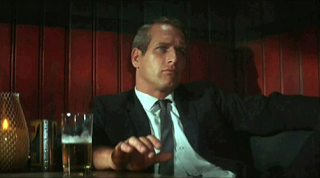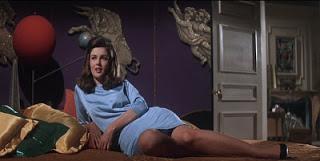
"The bottom is loaded with nice people, Albert. Only cream and bastards rise."
Harper (1966) updates the detective film to the Sixties. Jack Smight's movie trades smoky atmosphere for cracking craftsmanship, giving Paul Newman a standout role.Beaten-down P.I. Lou Harper (Paul Newman) juggles his floundering business with his dissolving marriage to Susan (Janet Leigh). Then Harper lands a job tracking down millionaire Ralph Samson, whose wife (Lauren Bacall) is wise to his philandering ways. Helped by Samson's daughter Miranda (Pamela Tiffin), family attorney Albert (Arthur Hill) and pretty boy hanger-on Allan (Robert Wagner), Harper uncovers a strange conspiracy of criminals and cultists out to kidnap, or kill, Ralph. Problem is, everyone around him seems suspicious.
Based on a Ross Macdonald novel, Harper effectively updates a hoary genre. Freshman scenarist William Goldman gives the material an edge, like a gruesome cigarette torture or Harper baiting a thug (Roy Jenson) with gay slurs. Harper's a moral cripple who can't satisfy his wife or keep promises; nonetheless, his ruthlessness makes him ideal for the job. Along with his flatfoot skillset, his grasp of human nature lets him peg people at a glance. His wife's no more immune than Samson's intimates, falling into his arms in a weak moment. The next morning, she dismisses Harper as "a lingering disease."
Cynicism aside, Harper never delves into the scumminess of contemporaries like The Detective and Madigan. It's cynical and witty, leaning on well-paced storytelling and sharp characterizations over faux-realism. Besides Harper, there's a cavalcade of intriguing bit parts, from lip-curling Elaine to Albert, whose straight arrow persona's compromised by his unseemly crush on Miranda. There are obvious villains like Dwight Troy (Robert Webber), sleazy husband to a washed-up actress (Shelley Winters), and preacher Claude (Strother Martin), whose Hispanic followers double as cheap labor for Samson. Even without the noir smokiness, Harper shows a world that's rotten and compromised to its bones.

From his earliest scene fussing with an alarm clock and reusing an old coffee filter, Paul Newman inhabits Harper's bone-weary persona. Newman's performance is guarded and subtle, relishing Goldman's barbed zingers ("I used to be a sheriff 'til I passed my literacy test") and callous professionalism, constantly chewing gum or rolling eyes at his depraved clients. Harper doesn't suggest a deep interior world, even in his scenes with Janet Leigh's nagging wife; he may regret his line of work but is fully resigned to it, as the only thing he can do. It's one of Newman's most memorable performances, burnt-out yet fully committed.
In support, Lauren Bacall is wonderfully snide and hateful, with Pamela Tiffin offering sensual duplicity. Barbara Harris doesn't have much screen time but her tortured, self-loathing performance makes a strong impression. Robert Wagner scores a solid role as a too-helpful playboy ("Detective work is fun!" he crows while cold-cocking a goon), with Arthur Hill a solid foil to Newman. There are also amusing bits for Roy Jenson and Strother Martin as a wacko cultist. The weakest role goes to Shelley Winters, wallowing in hammy self-parody.
Harper's plot unspools without resolving anything, leaving the ending perfect. Harper bears his soul to Albert, suggesting his disillusionment and duty, while Albert reveals his disgust with the Samson's world: "You were hired by a bitch to find scum!" Presaging Goldman's script for Butch Cassidy and the Sundance Kid, it ends in a freeze frame that leaves its hero's fate undecided. How better to end such a deeply ambivalent film?

